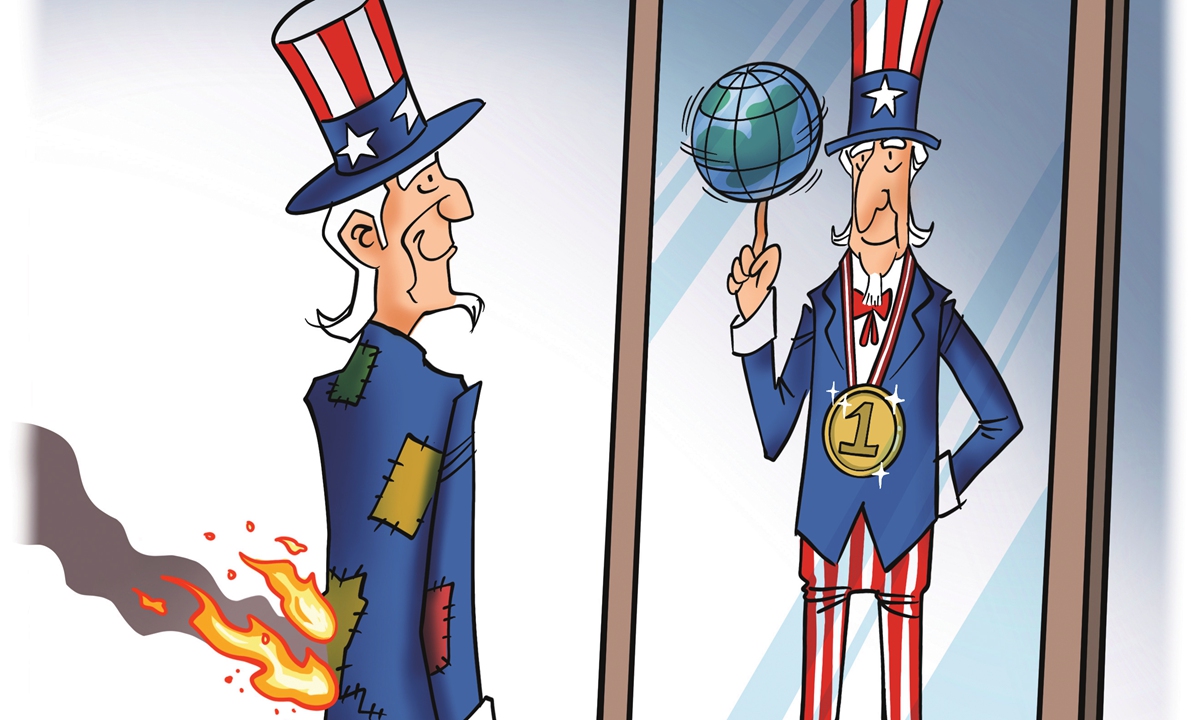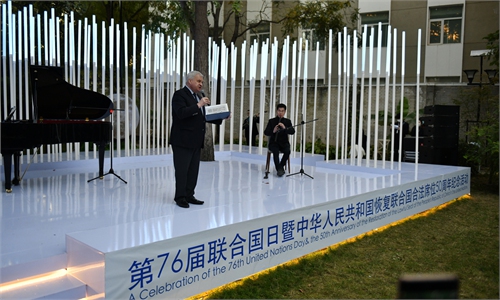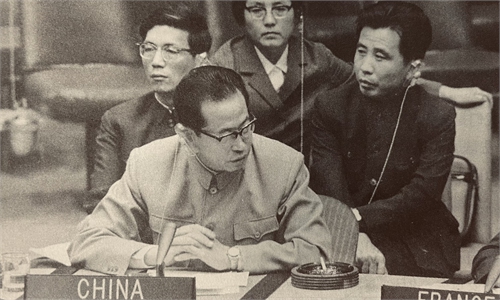
Illustration: Liu Rui/GT
Though expected to play a greater role amid global challenges posed by COVID-19, post-pandemic recovery and climate crisis, the United Nations is struggling to scrape by. Deep financial trouble has left the august body of multilateralism no choice but to halt recruitment and cut expenditure, which hamstrings its ability to carry out operations. Who is to blame for the UN's financial woes? And who is defying the consensus of the international community?UN website data suggests, by mid-October, one-third of the UN's membership dues and peacekeeping assessments are unpaid, amounting to $3.52 billion, of which the US accounts for two-thirds ($2.25 billion). These arrears include $1billion membership dues, $1.23 billion peacekeeping assessment and $19 million IRMCT (International Residual Mechanism for Criminal Tribunals) assessment. In membership dues alone, the US arrears are four times the sum of all other countries. It goes without saying, the US is the largest debtor of the UN and the culprit of the latter's predicament.
One must ask, being the superpower who claims the moral high ground of multilateralism, why doesn't the US fulfill its international obligations? Being the largest economy in the world, why can't the US pay its dues?
For quite some time, the US has been defaulting a huge sum of the UN membership dues, an explicit sign of its fake multilateralism. When the Biden administration took office, the US government made a high-profile announcement to return to multilateralism. Many pro-West folks cheered for the decision, only to be slapped in the face by harsh reality later on.
It is an obligation stipulated by the UN Charter to pay membership dues in full and on time. But the US government applies the rule wherever it suits itself and abandons it if otherwise. The US has been in arrears with the membership dues for more than 40 years, and even openly refused to pay its peacekeeping assessment in full. Ironically, when it comes to exercising long-arm jurisdiction and imposing sanctions on those who dare to say no, the US has always taken unilateral hegemonic actions in the name of multilateralism. The essence of "American-style multilateralism" is thinly veiled.
Earlier this year, the US Permanent Representative to the UN Linda Thomas-Greenfield tweeted shamelessly that he would take it as one of the priorities to make payment to the UN once he took office. Nevertheless, US hypocrisy was once again revealed. In a recent fiscal budget report issued by the UN, the US insists that it has undertaken excessive obligations and asks other member states to clear their unpaid dues. By defaulting membership dues, the US is coercing international organizations, and at the same time redirecting enormous funds into areas that maximize its own interests and exert unilateralism and hegemonism.
The international community will certainly not let it be. Some countries say the main reason for the UN's liquidity crisis is the one country responsible for 70 percent of the regular budget arrears. Some emphasize the long-term, large-amount arrears of a major contributor has caused adverse impact on the UN's fulfillment of mandates. Others point out that while repeatedly emphasizing its status as the largest contributor to the UN regular budget, the US is deliberately defaulting its dues in an attempt to control the funds for its own use. Inarguably, much of the "American-style multilateralism" is unilateralism in disguise.
Across the Pacific Ocean stands China, where the story goes a completely different way.
Since the restoration of its lawful seat of the People's Republic of China in the UN 50 years ago, China has always safeguarded the international system with the UN at its core and firmly supported the UN in playing a significant role in international affairs. As the largest developing country, a permanent member of the Security Council and the second largest contributor to the UN regular budget and peacekeeping assessments, China has acted with a great sense of responsibility, paid its dues in full and on time, and earnestly fulfilled all its financial obligations to the UN.
China is committed to building a fair and just UN, with no strings attached to its support for the organization. China upholds justice and equity, speaks up for developing countries, and actively participates in multilateral mechanisms under the aegis of the UN. According to China Foreign Ministry spokesperson, China has fully paid its share of UN regular budget and the assessments for all UN peacekeeping operations authorized by the Security Council during the mandated period as of December 31, 2021. China has proved its support for the UN and multilateralism with concrete actions.
At a time when the COVID-19 pandemic and regional conflicts pose multiplying challenges for global governance, fulfilling financial obligations becomes even more crucial to uphold the UN's leadership. Action speaks louder than words, and major countries should lead by example. Against international justice and historical trends are those who practice coercion through payment defaults and seek hegemony under the pretext of multilateralism. It is hoped that the major country on the other side of the Pacific could take responsibility, honor its pledges, and support multilateralism as it is. The choice is in its hands.
The author is an observer on current affairs. opinion@globaltimes.com.cn


